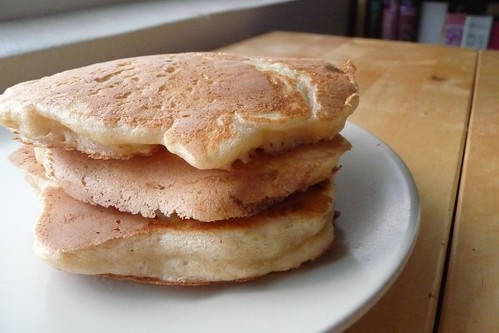Rauga pankūkas (Latvian Yeast Pancakes)

Periodically, I post a recipe from Latviešu ēdieni by Ņina Masiļune.
One of the things my husband has been missing from his home country is eating rauga pankūkas or yeast pancakes. I'm not really sure why it took us this long to get around to making them but after we replaced the dead yeast (always check your expiration dates!) he decided he really wanted to make a batch for our Sunday breakfast.
Now I've said before that if breakfast were up to me, we'd subsist on bagels because they're easy to pop in the toaster and load up with cream cheese. When I was single, that was basically breakfast every day -- on the days I managed to eat breakfast at all! My husband just shook his head at me and, ever since we met, has always made breakfast for the two of us. Sundays, however, are special.
Since we allow ourselves an extra hour of sleep and Sundays are usually slow-moving days, he likes to make something that maybe takes a bit more work or is a bit more special than an ordinary day. One Sunday might involve crepes with my homemade freezer jam, another might be a Dutch baby or popovers, maybe even fresh-baked muffins. And last Sunday, he opted to finally make yeast pancakes.
Yeast pancakes, or rauga pankūkas as they're known in Latvian, are similar to regular pancakes, except for two important differences: first, in place of baking powder, yeast is used, and second, no fat is used in the batter at all. While you can put this together the morning you wish to have it, we found that involved getting up too early, so after allowing the pancakes to rise for 90 minutes, we put it in the fridge overnight. The results are a fluffy, beautifully thick pancake with great flavor, perfect with preserves or maple syrup.
Rauga Pankūkas (Latvian Yeast Pancakes) [printable recipe]
Adapted from Latviešu ēdieni by Ņina Masiļūne Serves 2- 200 g all-purpose flour1
- 200 g milk
- 1 egg, separated
- 20 g sugar
- pinch of salt
- 10 g / 1 tsp / 1/2 packet active dry yeast
- butter or oil for frying
Beat the egg white until it becomes white and fluffy, soft peaks optional. Fold into the batter in thirds, being careful not to overmix. If the batter is too stiff, add a bit of water or milk to loosen it up enough to be scoopable. Wet a spoon4 before portioning each pancake so the batter doesn't stick and fry as with ordinary pancakes in a non-stick griddle or pan set over low to medium-low heat in a bit of butter or oil until golden brown and delicious.
Notes:
- We used a mixture of 120 g all purpose flour and 80 g whole wheat pastry flour in one of our sets. The pastry flour gives that whole wheat taste without adding too much gluten.
- Tempering isn't necessary here as the milk is below the temperature at which eggs curdle (between 160F and 170F), but you can do it if it makes you feel better.
- If you want to make these just before breakfast, the easiest is to prepare the batter through the rise the night before. Then all you have to do is beat some egg whites. Otherwise, you'll be up at 7a to have a 10a brunch on the breakfast table.
- Wetting the spoon in between pancake batter portions is important. This stuff sticks.
